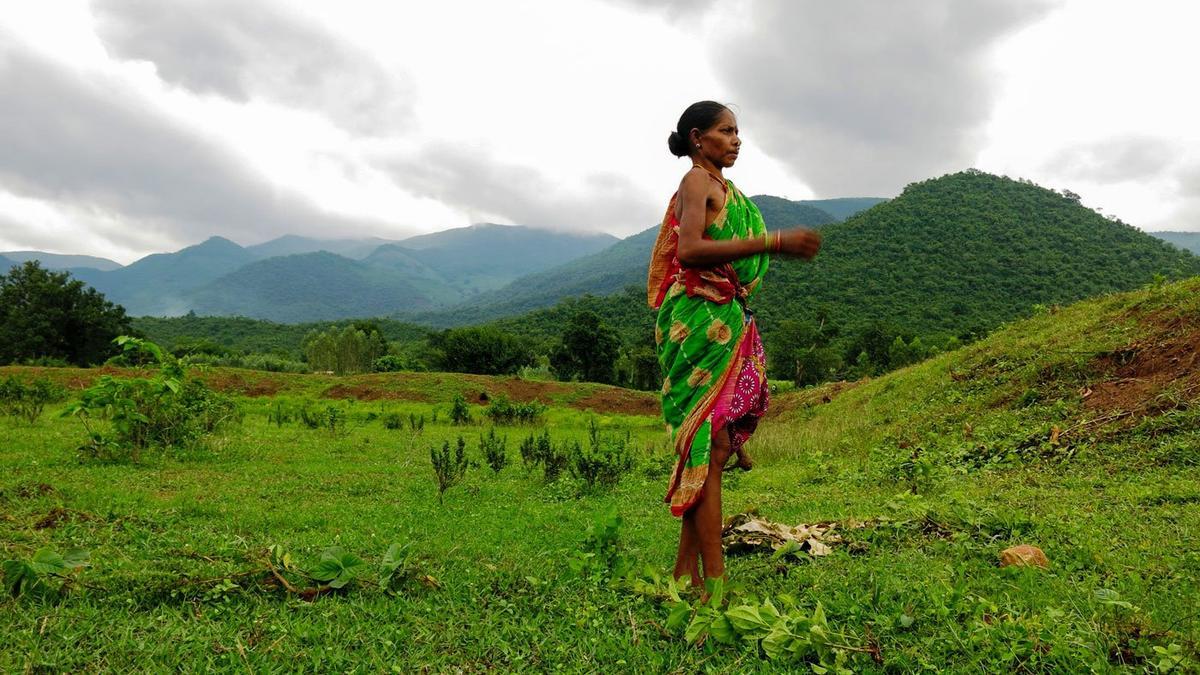
Kunuji Kulusika bends over a gleaming silver plate, meticulously examining an array of seeds meticulously laid out on its surface. Her voice resonates with pride and expertise as she identifies each of the dozen or so seed types, which include beans, small beans, horse gram, pigeon peas, mustard, corn, and niger seeds. This rich collection of heirloom seeds, handed down through generations, forms the cornerstone of Kunuji’s agroecological farming in the Niyamgiri mountains of Odisha’s Eastern Ghats—a practice vividly captured in the recent documentary “Seed Stories,” directed by Chitrangada Choudhury. “These are seeds we have always grown,” Kunuji declares in the film. “A bit of this, a bit of that… many different things… that is how we farm. Why should we go to the market for seeds?”
“Seed Stories” was screened at the National Centre for Biological Sciences (NCBS) in collaboration with the Bengaluru Sustainability Forum (BSF), under the Climate Charche series. According to the series’ concept note, Climate Charche aims to foster discussions about the intricate links between climate change and urban ecosystems. The dialogues are designed to engage diverse audience groups in the city, facilitating the exchange of knowledge and identification of gaps in local climate plans, emphasizing adaptation, resilience, and climate justice.
A nuanced exploration of the conservation efforts by barefoot ecologist Dr. Debal Deb, “Seed Stories” sheds light on the preservation of over 1,000 endangered heirloom rice varieties amidst a growing tide of genetically modified cotton seeds and the accompanying toxic chemicals. The documentary offers an intimate portrayal of how these new agricultural practices are transforming a region and its people, who have a deeply ingrained understanding of agroecology. It challenges audiences to ponder the true essence of sustainability.
Choudhury, an award-winning journalist and researcher based in Goa, has been working on this film as part of her broader body of work that spans nearly 20 years. “I am from Orissa,” she shares, “but I’ve spent the initial years of my journalistic career in Bombay and Delhi, reporting on Schedule Five landscapes: essentially areas where Scheduled Tribe populations are significant, like parts of Chhattisgarh, Jharkhand, and Orissa.”
Her investigative journalism often highlights the brutal consequences of so-called mainstream development on indigenous communities. “This violence is often justified in the name of national development,” Choudhury states, noting that these communities are frequently labeled as backward in mainstream narratives to rationalize the aggressive push for development.
Choudhury first met Dr. Deb in 2014 while profiling him for a national daily. Dr. Deb, she explains, is deeply skeptical of what he describes as “develop-mentality”—a mindset that demands an unending cycle of inputs, outputs, consumption, and waste on a finite planet.
From 2018 onwards, Choudhury and her associate director, Aniket Aga, began volunteering at Deb’s Basudha farm in the ecologically rich and sensitive Rayagada district in southern Odisha.
. There, they discovered a wealth of knowledge among the local people about how to maintain biodiversity while preserving their own food sovereignty. “This knowledge has largely disappeared from the so-called developed parts of India, where communities have lost their own seeds and traditional knowledge systems,” Choudhury remarks.
The film captures a society teetering on the edge of a monumental shift, as new agricultural practices threaten the old. Traditional farming methods in this part of Odisha have a history stretching back thousands of years, but the introduction of cotton—which requires extensive chemical inputs—is slowly eroding these methods. “Chemicalized monoculture cannot coexist with their longstanding polycropping systems,” Choudhury explains. “The erasure of these traditional practices, again in the name of development, is what the film essentially documents.”
The process of capturing these dramatic changes in agricultural practices and their impact on people’s lives unfolded naturally, Choudhury notes. She felt compelled to visually document these transformations, fearing that in a few years, the landscape could be irrevocably altered by the encroachment of cotton farming. She sees this as a slow form of violence, taking place plot by plot, farm by farm, drawing people into global cotton supply chains but under precarious conditions. “As Dr. Deb says in the film, cotton—any cotton—is not suitable for that landscape. Once communities lose their own seeds, it will be difficult to retrieve the ecological resources that have sustained them for so long,” she adds.
“Seed Stories,” interspersed with stunning visuals of cloud-shrouded hills, verdant rice fields, and a brilliant azure sky, captures both the landscape and the people who live there. The film juxtaposes close-ups of colorful seeds, scarlet bugs on damp cotton bolls, armies of ants, and other elements with expansive shots of a train traversing grazing cattle, smoldering forests, and cotton-studded fields, highlighting the rich biodiversity of the region and the creeping changes.
Most of the footage was shot between 2019 and 2022, with planning centered around specific agricultural seasons like sowing and harvesting, as well as during Choudhury and Aga’s volunteer visits to the farm. “It was a slow ethnographic process, and we wanted to build a rapport with the people we filmed over time,” she explains.
The project was primarily self-funded, with collaboration from Chhattisgarh-based filmmaker and human rights activist Ajay T.G., and small grants from the Wenner-Gren Foundation and the Centre for Climate Change and Sustainability (3CS) at Ashoka University. An early cut of the film premiered at the Kolkata People’s Film Festival in January (KPFF 2024), an independent cinema festival. It has since been showcased at the Chennai International Documentary & Short Film Festival, Festival delle Terre in Rome, and various other independent venues across the country. Additionally, the film is slated for this year’s All Things Living Environmental Film Festival (ALT EFF) in November.
Choudhury hopes to submit the film to several more international film festivals, depending on available resources and interest, before making it publicly available. “We plan to screen it to as many audiences as possible, including educational institutions, environmental groups, civil society organizations, and indigenous rights groups,” she states.
To learn more about “Seed Stories,” visit https://www.ourcinema.in/festival/film/seed-stories/.












